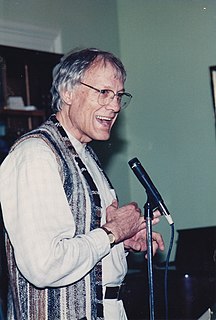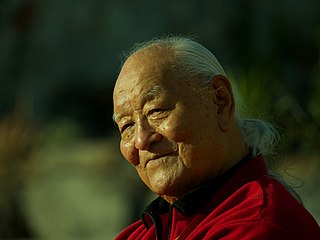A Quote by Walter Lippmann
We forge gradually our greatest instrument for understanding the world - introspection. We discover that humanity may resemble us very considerably - that the best way of knowing the inwardness of our neighbors is to know ourselves.
Related Quotes
Some of us can accept others right where they are a lot more easily than we can accept ourselves. We feel that compassion is reserved for someone else, and it never occurs to us to feel it for ourselves. My experience is that by practicing without 'shoulds,' we gradually discover our wakefulness and our confidence. Gradually, without any agenda except to be honest and kind, we assume responsibility for being here in this unpredictable world, in this unique moment, in this precious human body.
The arts have long been an integral and vibrant part of our nation's cultural heritage. In its many forms, art enables us to gain a deeper understanding of ourselves and of our society. Providing us with a unique way to learn about people of other cultures, it allows us to discover all that we have in common. At its best, art can beautify our cities, encourage economic development and social change, and profoundly affect the ways we live our lives.
Life is a continuous flux. Our nonhuman ancestors bred, generation after generation, and incrementally begat what we now deem to be the species homo sapiens - ourselves. There is nothing about our ancestral line or about our current biology that dictates how we will evolve in the future. Nothing in the natural order demands that our descendants resemble us in any particular way. Very likely, they will not resemble us. We will almost certainly transform ourselves, likely beyond recognition, in the generations to come.
The Savior’s words are simple, yet their meaning is profound and deeply significant. We are to love God and to love and care for our neighbors as ourselves. Imagine what good we can do in the world if we all join together, united as followers of Christ, anxiously and busily responding to the needs of others and serving those around us — our families, our friends, our neighbors, our fellow citizens.
The gift our enemy may be able to bring us: to see aspects of ourselves that we cannot discover any other way than through our enemies. Our friends seldom tell us these things; they are our friends precisely because they are able to overlook or ignore this part of us. The enemy is thus not merely a hurdle to be leaped on the way to God. The enemy can be the way to God. We cannot come to terms with our shadow except through our enemies.
We have all of us free access to all that is great, and good, and happy, and carry within ourselves a key to all the treasures that heaven has to bestow upon us. We starve in the midst of plenty, groan under infirmities, with the remedy in our own hand; live and die without knowing and feeling anything of the One only God, whilst we have it in our power to know and enjoy it in as great a reality as we know and feel the power of this world over us; for Heaven is as near to our souls as this world is to our bodies; and we are created, we are redeemed, to have our conversation in it.
We must relinquish our passive observation of the world outside; we can open the door to the world we want. In understanding ourselves, we come to understand the world. In allowing ourselves to heal, we become the healers of the world. In praying for peace, we become bringers of peace. Thus we actualize the power within us to remedy the psychic wounds of humanity.
Many people do not know that they can strengthen or diminish the life around them. The way we live day to day simply may not reflect back to us our power to influence life or the web of relationships that connects us. Life responds to us anyway. We all have the power to affect others. We may affect those we know and those we do not even know at all. . . . Without our knowing, we may influence the lives of others in very simple ways.
Duality is the real root of our suffering and of all our conflicts. All our concepts and beliefs, no matter how profound they may seem, are like nets which trap us in dualism. When we discover our limits we have to try to overcome them, untying ourselves from whatever type of religious, political, or social conviction may contain us. We have to abandon such concepts as 'enlightenment', 'the nature of the mind', and so on, until we no longer neglect to integrate our knowledge with our actual existence.

































